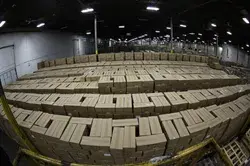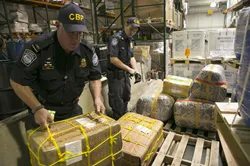Author: Acting Commissioner Kevin K. McAleenan
U.S. Customs and Border Protection’s complex border security mission includes protecting our nation’s economic vitality through both trade enforcement and facilitation. One year ago, on February 24, 2016, the Trade Facilitation and Trade Enforcement Act of 2015 (TFTEA) was signed into law.

at the Port of Miami. Photo Credit:
Glenn Fawcett
TFTEA is the first comprehensive authorization of CBP since the Department of Homeland Security was created in 2003, and set forth an overall objective of ensuring a fair and competitive trade environment. Since its enactment, we’ve made tremendous progress in the past year, continuing and improving upon our mission to enforce trade laws and to facilitate the lawful trade that keeps the engine of our economy running smoothly.
In the area of trade enforcement, TFTEA directed enhanced enforcement of antidumping and countervailing duty (AD/CVD) laws in order to ensure a level playing field for U.S. companies. In Fiscal Year (FY) 2016, CBP enforced 364 AD/CVD Orders covering around 150 products. In addition, during that time period $13.9 billion of imported goods were subject to AD/CVD, and CBP collected $1.5 billion in AD/CVD deposits. TFTEA provided CBP with new authority to investigate allegations of AD/CVD evasion through enactment of the Enforce and Protect Act. Companies can now file allegations of evasion of these orders electronically via the Enforce and Protect Act on our e-allegations web portal.

hoverboards sit in a Chicago warehouse
awaiting further CBP processing. Photo
Credit: Kristoffer N. Grogan
TFTEA also helps CBP enforce laws that protect intellectual property rights (IPR), protecting consumers against counterfeits. In FY 2016, CBP and Immigration and Customs Enforcement (ICE) seized a record number of shipments containing fake goods – more than 31,000 shipments – a 9 percent increase from FY 2015. The total estimated manufacturer’s suggested retail price of the seized goods, had they been genuine, was more than $1.38 billion.
Further, TFTEA provides additional authority to safeguard human rights by strengthening the prohibition of goods made by forced labor, including child labor, into the United States. CBP works with its Partner Government Agencies including close coordination with the Department of Labor, which compiles lists of goods that are likely produced by child or forced labor. To date CBP has issued Withhold Release Orders on several commodities from China: soda ash, calcium chloride, potassium products, Stevia and its derivatives, and peeled garlic.
To coordinate these enforcement efforts, CBP’s Trade Enforcement Task Force works closely with partner government agencies, including the Department of Commerce and ICE’s Homeland Security Investigations. The Task Force focuses on detecting high-risk activity and disrupting illicit trade networks that hurt our economy and U.S. consumers.
Turning to trade facilitation, TFTEA extended funding to complete the development and implementation of the Automated Commercial Environment (ACE), which transmits the private sector’s import-export data to 47 partner government agencies, eliminating over 200 different forms and streamlining trade processes.

Port of Philadelphia. Photo Credit: James
Tourtellotte
TFTEA also formally recognized and promotes CBP’s Centers of Excellence and Expertise (CEEs). All 10 Centers are fully operational, increasing uniformity at the ports, facilitating the timely resolution of trade compliance issues nationwide, and strengthening our knowledge about industry practices.
TFTEA also benefits small businesses and individual consumers by increasing the “de minimis” value – that is, the value of a shipment of merchandise imported by one person or company in one day that generally may be imported free of duties and taxes – from $200 to $800 per shipment.
TFTEA is only one year old, but already it has helped us to refine and strengthen the execution of our broad trade mission – a mission that is critical to our nation’s economic security and vitality.

